Somalia
Somalia, in long form the federal republic of Somalia is a country located at the eastern end of the Horn of Africa. The territories which had once been administered by the British form Somaliland, a structured country, but not recognized by the international community which does not wish to see the borders changed.
Somalia’s history
From Antiquity to the 1950s
Some authors claim that during Antiquity, the region known by the Egyptians as the country of Punt was in Somalia. The coast was known by the Romans, the Greeks and the Indians since it was the most important commercial center for myrrh and frankincense as well as in less importance for ebony and gold. Arab traders settled on the coast and the Somalis adopted Islam, which became established permanently from the 13th century: it was the beginning of the sultanate. During the Middle Ages, relations with the neighboring kingdom of Ethiopia were strained. In the sixteenth century, Portugal became interested in the Somali coast, without managing to settle there. From 1875, Great Britain, France and Italy claimed Somalia, while the Ethiopian emperor Menelik II planned to invade the country. During the 1880s and 1890s, Italy acquired various territories on the Benadir coast, which it united in 1905 into a colony, formalized by a law of April 5, 1908.
Despite resistance to the Western occupation organized by Mohamed Hassan, Benito Mussolini’s Italy ended up controlling Somalia as well as Ethiopia and northern Kenya, until the Second World War. On August 3, 1940 (or the 4th according to other sources), approximately 40,000 Italians invaded British Somalia under the command of General Guglielmo Nasi. They seize in a few days several badly defended cities. British forces in Somaliland receive some reinforcements and a new commander, Major General Godwin-Austen. Deeming the forces involved too uneven, the latter asked on August 15 the withdrawal of British troops. The last British soldiers were evacuated to Aden on the 17th. The Italians seized Berbera on the 19th and annexed British Somalia to Italian East Africa. During this campaign, British casualties were 38 killed, 71 injured and 49 missing compared to 465 killed, 1,530 injured and 34 missing for the Italians. These territories will ultimately be lost by Italy, following its defeat at the end of the Second World War.
Trust Territory of Somalia
In 1949, the United Nations (UN) granted Italy trust territory over Somalia while a year earlier, the Ogaden region had been assigned to Ethiopia. The current flag was adopted on October 12, 1954.
State of Somalia
On June 25, 1960, the British Somali Protectorate gained independence as the State of Somalia. The State of Somalia disappears on July 1 when it merges with the Trust Territory of Somalia under Italian administration to form the Somali Republic.
Somalia republic
From 1960 to 1969, and under the chairmanship of Aden Abdullah Osman Daar, then Abdirashid Ali Shermarke, Somalia tried to establish a democratic government, but clan struggles between the north and the south of the country, strained relations with the neighboring countries, make these years an unstable period.
Era Siyaad Barre
In 1969, General Mohamed Siad Barre seized power by a coup and replaced the democratically elected government with the new regime in the Somali Democratic Republic. According to former Ethiopian diplomat Mohamed Hassan, the first years of the Siyaad Barre regime were the most prosperous for Somalia. Education and social conditions are improving, and an official script is finally adopted. Due to Somalia’s close ties to the USSR, Barre declared that the country would now be a socialist state. This alliance between the two countries was short-lived, in 1977, Somalia tried to take control of the Ogaden, an Ethiopian territory, during the conflict known as the war of the Ogaden. Instead of supporting Somalia in its expansionist moves, the Soviet Union instead supported the Marxist government of Ethiopia, which ended the good relations between the two allies. The United States then moved closer to Somalia and the World Bank and the IMF intervened to guide economic policy. The war of the Ogaden (1977-1978) contributed to weakening the power of Barre and favored the installation of an endemic famine whose paroxysm is reached in 1984.
The country was plagued in the 1990s by political factions. Official patronage and corruption have shaken confidence in the central government. A climate of discontent reigned then towards the regime of president dictator Siyaad Barre, which led to its collapse in 1991. The country was then plunged into a state close to chaos. Indeed, as a result of this incident, Somalia has become a failed state. The country fell under the control of warlords without ideology or political agendas. Their only motivations were the lure of illicit gain and pillage. Trafficking in drugs and weapons was one of their activities. Thus, these warlords opposed the creation of any central government because of the threat that such a government posed to their illicit activities.
The collapse of Siyaad Barre’s regime dragged the country into a civil war between the faction that supported interim president Ali Mahdi Mohamed and the faction that supported General Mohamed Farrah Aidid. This conflict was in fact a reflection of the rivalry between the two most important clans of the Hawiye-Abgal families and Haber Ghidir for control of the Somali state. These factions plundered infrastructure and food distribution points, leaving more than a million refugees and five million people in starvation and disease. The war has contributed to socio-economic crime and the fragmentation of the state. The conflict specifically targeted the control of food and weapons.
Civil War and Operation Restore Hope
Following the civil war and faced with the threat of famine, the UN launched a so-called “humanitarian” operation in Mogadishu from April 1992: the United Nations Operation in Somalia (ONUSOM). Pakistani “peacekeepers” suffering heavy losses in front of the Somali factions, the big powers intervene. In December 1992, under a UN mandate, the United States launched Operation “Restore Hope”. It was the first intervention carried out in the name of international humanitarian intervention law. This was ultimately a fiasco, symbolized by the battle of Mogadishu in October 1993, in which 19 American soldiers died, as well as a Malaysian blue helmet and nearly a thousand Somalis. President Bill Clinton then decides to withdraw his troops, and 8,000 UN peacekeepers take over until 1995. 151 peacekeepers and 3 foreign civilians are killed.
The country was then divided into several factions at war with each other. The center and the south are controlled by Hussein Mohamed Aïdid; the northwest by Mohamed Ibrahim Egal, elected president of the self-proclaimed Republic of Somaliland in 1997, he died in 2002. In January 1997, a government agreement, sponsored by Ethiopia and Kenya, failed to solve the problem of disarmament and state reconstruction. The northeast declares itself autonomous in 1998 under the name of Puntland. On August 26, 2000, the transitional parliament in exile elected a new president in the person of Abdiqasim Salad Hassan, in a particularly difficult context. The country remains struggling with clan rivalries. After various fruitless attempts at conciliation, a reconciliation conference culminated in July 2003 in a draft national charter providing for federalism and setting up transitional federal institutions.
Election of Abdullahi Yusuf Ahmed
On October 10, 2004, the Transitional Federal Parliament of the Republic of Somalia, exiled to Kenya due to clashes between warlords in Mogadishu, and formed in equal numbers of representatives from each of the four major Somali clans, elected as as interim president Abdullahi Yusuf Ahmed, president of the Pays de Pount. At the head of the Transitional Federal Government, he has appointed Ali Mohamed Gedi, a veterinarian by profession, as Prime Minister, with the mission of forming a coalition government with the country’s various warlords. Somali institutions are located in Kenya as a security measure against the internal situation in Somalia. The institutions in exile have no control over the country outside certain districts of the capital Mogadishu, their authority is not recognized inside the country, but only by foreign governments. Since February 26, 2006, the transitional government has been in Baidoa, Somalia. Some areas of Somalia, although 4,500 km away from the epicenter, were devastated by the tsunami of December 26, 2004. Some villages on the Indian Ocean coast were destroyed by the tsunami and around 110 people (mainly fishermen) were killed.
Somalia’s economy
Since the early 1991s, the civil war has hampered the country’s economic development. Somalia’s economy is mainly agricultural, but is also based on the exploitation of salt. Several international companies, such as BP or ExxonMobil, show an increasing interest in Somali oil: indeed, the number of barrels in Somalia is estimated between 8 and 15 billion. The economy is assisted by international aid and the inflow of foreign currency from the diaspora, estimated at more than 60% of GDP in 2007.
In 2001, Somalia was ranked last on the list of countries by human development index. It has not been classified since. The national currency, the Somali shilling, has had no value since 1991. The US dollar is used more for transactions, especially the most important. The Saudi riyal is also accepted, when the courses are known. Ethiopian birr is accepted in areas bordering Ethiopia. The Kenyan shilling is also an accepted currency which is becoming increasingly important in trade. In Somaliland, it is common to see transactions being made in pounds sterling. Across Somalia, the use of the euro is marginal.
The road network, very important for the development of the economy, is in a catastrophic state. The roads, or what is left of them, are dangerous, and full of potholes, or holes. It is also dangerous to venture on the roads of Somalia where gangsters are supervised by warlords. Now, for moving vehicles, the roads give way to large dirt tracks. In Somaliland, the road network is better maintained and denser, but with the lack of foreign exchange, it is difficult to maintain. There is economic trade between Somaliland and Ethiopia, and trucks leave in large numbers from Hargeisa to Ethiopia, including some for the khat trade. Given the catastrophic state of the road network, getting into the interior of Somalia off the coast is expeditionary: often, for example, to travel 40 km, it takes a whole day.
The cities of Somalia, apart from a few streets of Mogadishu, have no electricity. The Somali national power company ceased operations in 1990, when the company’s employees were laid off after the civil war. Wages had not been paid for several months. However, in Somaliland, a limited network exists, and supplies mainly Hargeisa and Berbera. Most of Somalia’s internet network exists almost exclusively in Somaliland. In Mogadishu, electricity is available for only a few rare families, often linked to warlords, or the new Somali government, helped by the UN and the international community. In the evening, seen from the International Space Station, Somalia appears almost completely in black, almost like North Korea, or certain poor African countries.
Somalia’s demography
The country had an estimated 10.8 million inhabitants in 2016. Estimates are difficult due to the large number of nomads and refugees who are trying to flee from famine and inter-clan wars. Almost all Somalis are Muslim. Before 1991, there were around 5,000 Italians, who were mostly aid workers, traders, or aid workers. More than 95% fled the civil war between 1991 and 2005. In 2017, the population is 14.7 million. In 2013, there were less than 20 Italians, mainly men and women religious, from the Catholic Church, and concentrated in Mogadishu.
Somalia’s education
In 1950, the UN entrusted the former Italian Somalia to a mandate from Italy, until 1960. The Italians then tried to form an indigenous elite and opened the University of Mogadishu with the aim of forming an elite to manage and administer the country. After the creation of Somalia in 1960, officials from Somaliland moved to the south. In 1971 and 1972, to help unify the country, Somali became the official language, while English continued to be used in the north and Arabic, English and Italian in the south. Italian has not been taught since 1988. Emphasis is placed on English and Arabic.
In Italian Somalia, illiteracy was very important. In British Somaliland, an indigenous elite was formed. The actual enrollment rate for the period 2008-2012 in primary education is 65%, but due to significant wastage, only 15% of children are studying in the secondary cycle. The illiteracy rate remains very high, at 61% for adults, 47% for young men between 15 and 24 years of age, and 63% for young women of the same age group. It mainly affects the interior of the country, outside Mogadishu where the few schools are concentrated.
Since 1991, there is no longer a State to oversee the education system, the University of Mogadishu no longer works. Public schools have been closed since January 1991. Already in central and eastern Somalia, a large number of schools have been closed since 1987, with the outbreak of the civil war. Some very rare private schools operate, especially in Mogadishu. But the number of students is extremely limited, the registration prices are prohibitive for the greatest number of Somalis. Except in Mogadishu, where some private schools operate, there are no more open schools in the country, except in Somaliland. , where private schools are open, and where the state of Somaliland is more or less trying to establish a public school. The industry (especially textiles), which was flourishing before 1991, with the help of the USSR and China, almost no longer exists. There has been no insurance system in Somalia since 1991. In total, the few private schools in Somalia have trained less than 0.3% to 0.5% maximum of Somali schoolchildren (except Somaliland) between 1991 and 2015 , which is very low, and the few Somalis who have since graduated, for the most part, live outside Somalia, where they have more prospects of finding employment.
Since 1991, the archives are no longer protected: tax centers, town halls, or other administrative buildings were closed, then generally looted. Often, many documents were burned, including cadastres, and birth registration registers. All civil servants, administrative agents, teachers, municipal staff lost their jobs in January 1991, the date when the Somali state collapsed. However, wages had not been paid for several months already. In Somaliland the education system remains limited, especially in rural areas. In the event that someday peace returns to Somalia, the Somali state will take decades to rebuild the country’s state system: education will be very important, to train new officials and manage the country. But above all, it is the money and the currencies that will run out, the Somali State is ruined, after more than 20 years of civil war. The assistance of the IMF, the World Bank, and the rich countries of the Gulf (Qatar, Saudi Arabia, United Arab Emirates) will have to be very important, to rebuild schools, infrastructures, and rebuild a national army. If peace returns one day in Somalia, the difficulties due to the lack of education will be immense: skills, and trades no longer have training, or no longer exist: there is for example, more electricians: the few electricians in Somalia are those who were trained before 1991, and they are generally over 45 years old. The well-to-do Somali warlords call on young Yemeni electricians. Another example: the sewers are no longer maintained, as is the garbage collection. Another scenario: education. The teacher shortage is going to be huge, and the Somali government will take decades to resolve this problem. On the other hand, in Somalia, the D system is very widespread: there are many street vendors, many markets, and agriculture has remained a safe bet, but limited, given the arid climate of the country.
Somalia’s language
The official language of Somalia is Somali (which has various variations), and Arabic is the second language. Italian and English are the ancient colonial languages and enjoy a special status: they are used exclusively in higher education.
-
Somalia
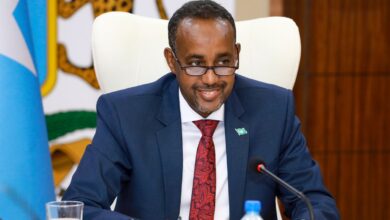
Somalia’s Prime Minister Orders Cease-Fire After Violent Clashes In Mogadishu
Somalia’s Prime Minister Mohamed Hussein Roble on Monday ordered immediate cease-fire after violent clashes between Somali forces and opposition groups…
Read More » -
Somalia
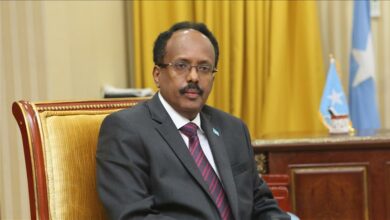
Somalia: Rival Forces Clash Amid Row Over President Mohamed’s Extended Term
Gunfire erupted in the capital city of Somalia, Mogadishu, on Sunday between security forces supporting the government and others opposing…
Read More » -
Somalia

Somalian Government Welcomes African Union’s Initiative For Free, Fair Elections
The Somalian government on Thursday welcomed an African Union (AU) initiative to hold a constructive dialogue between the country’s warring…
Read More » -
Somalia
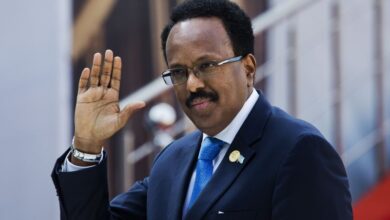
Somalia’s President Signs Controversial Law Extending Mandate By Two Years
Somalia’s President Mohamed Abdullahi Mohamed on Tuesday signed a controversial measure that extends his official term by two years, reported…
Read More » -
Somalia

Somalia’s Lawmakers Vote To Extend Embattled President Abdullahi’s Term
Somalia’s lawmakers on Monday voted to extend the mandate of President Mohamed Abdullahi’s government by two years in an attempt…
Read More » -
Somalia

Somalia’s Political Deadlock Far From Over As Latest Negotiation Talks Fail
The latest round of talks aimed at resolving Somalia’s election deadlock ended without any progress in Mogadishu on Wednesday, a…
Read More » -
Somalia

US Urges Somalia To Hold Transparent Elections Without Any Further Delay
The United States (US) on Friday urged the Somalian government to immediately hold transparent and inclusive elections to end a…
Read More » -
Kenya
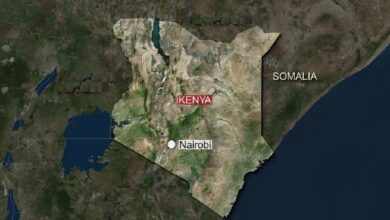
Kenyan Government Opts Out Of Maritime Dispute Case Hearing With Somalia At The ICJ
The Kenyan government has reportedly decided not to take part in the hearings of its maritime dispute case with Somalia…
Read More » -
Somalia

Somalia: Opposition Leaders Agree To Postpone Friday’s Anti-Government Protest
Somalia’s opposition leaders have decided to postpone an anti-government protest planned for Friday after a meeting with Prime Minister Mohamed…
Read More » -
Somalia
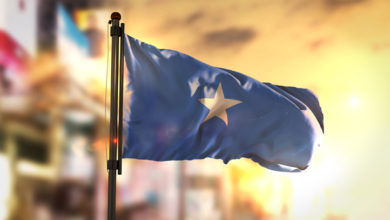
Somalia: UN Envoy Urges Political Leaders To Quickly Agree On Election Date
The United Nations envoy for Somalia on Monday urged the Somalia government to conduct elections in the country as soon…
Read More » -
Somalia
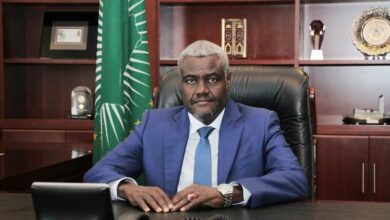
AU Chief Deeply Concerned Over Somalia’s Political Impasse, Calls For Consensus
The African Union (AU) chief Moussa Faki Mahamat said he is deeply concerned at the deteriorating security and political situation…
Read More » -
Somalia

Somalia Rejects Kenya’s Plea To ICJ To Delay Maritime Case Hearing For Fourth Time
The Somalia government on Thursday rejected the Kenyan government’s request to the International Court of Justice (ICJ) to delay the…
Read More » -
Somalia

Somalia: Opposition Alliance Refuses To Recognize President As Official Term Expires
Somalia’s opposition parties on Monday declared that they no longer recognize Mohamed Abdullahi Mohamed as the president of the country…
Read More » -
Somalia
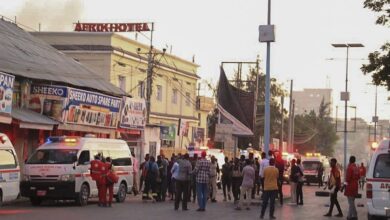
Somalia: At Least Nine Killed In A Weekend Hotel Attack In Capital Mogadishu
At least nine people were killed and several got injured in a weekend attack at a hotel in Somalia’s capital,…
Read More » -
Kenya
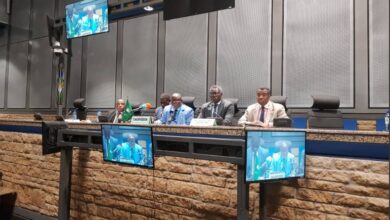
African Union Appeals For Dialogue Between Kenya, Somalia To Ease Border Tensions
The African Union (AU) on Tuesday called for dialogue between Kenya and Somalia to ease tensions along the common border…
Read More » -
Kenya

Somalia Government Agrees To Resolve Diplomatic Row With Kenya
Somalia’s government has agreed to de-escalate tensions with Kenya during a conference held in Djibouti on Monday, reported Anadolu Agency.…
Read More » -
Somalia

Somalia: President Names New Prime Minister, Announces Plan For National Elections
Somalia President Mohamed Abdullahi Mohamed appointed political newcomer Mohamed Hussein Roble as the country’s prime minister on Thursday, reported CGTN…
Read More » -
Somalia

Somalia: Prime Minister Hassan Ali Khaire Gets Ousted In A No-Confidence Vote
Somalia’s Prime Minister Hassan Ali Khaire was forcedly removed from his post on Saturday after the majority of parliament members…
Read More » -
Somalia

Somalia: National Electoral Commission Postpones November 2020 Elections
Somalia’s Independent Electoral Commission has confirmed that the upcoming parliamentary and presidential elections will not take in the East African…
Read More » -
Somalia
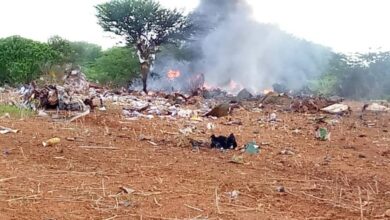
Somalia: At Least Six Killed As A Plane Carrying Coronavirus Aid Supplies Crashes
At least six people were killed in a plane crash in Somalia on Monday. The plane was carrying aid supplies…
Read More » -
Benin

Coronavirus: Four More African Countries Report First Confirmed COVID 19 Cases
Four more African nations including Benin, Liberia, Somalia, and Tanzania have confirmed their first coronavirus cases on Monday, reported Reuters.…
Read More » -
East Africa

UNSC Approves Resolution To Withdraw 1,000 Troops From Somalia
The United Nations Security Council on Friday approved a resolution to cut 1,000 troops from a regional peacekeeping force in…
Read More » -
Burkina Faso
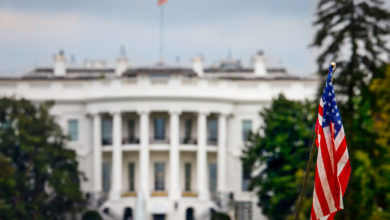
The U.S. Considering Plan To Put New Travel Restrictions On African Countries
A new report suggests the United States government is planning to put stricter travel restrictions for countries whose nationals frequently…
Read More »

